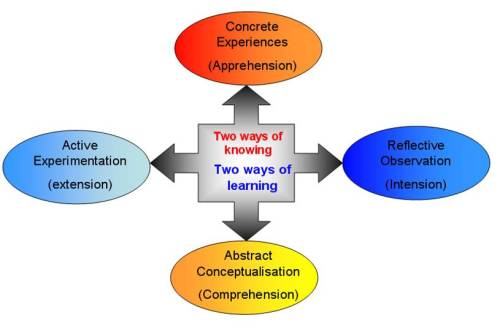I was reading the CLC HR Quarterly trends report Q1 2009 this morning and it got me thinking again about ‘career experiences’. In an earlier post I wrote about career development and why it’s important that you promote development opportunities for your staff that involve learning from experiences and relationships in the workplace.
The CLC report says that “organizations must invest in increasing engagement levels of their high potential talent and focus on maximising on-the-job experiences for employee development. Council research highlights that on-the job, experience based development is the most effective when developing employees and signals commitment to their advancement.”
Similarly to my post they mention the provision of stretch opportunities as a great way to provide a career experience.
So why are these career experiences so important?
Experience can be seen as ‘the totality of ways in which humans sense the world and make sense of what they perceive’ (Miller and Boud. 1996). It has huge potential to assist people in transforming all they experience and perceive, into tacit learnings that they can practice and apply in real life.
I loved uni and other formal training programs that I’ve attended, but the key benefit about experience is that it links classroom lessons and theory, and applies it to the real world and it is for this reason that experiential learning is increasingly used in schools, workplaces and tertiary education institutions around the world.
A great model to clearly explain experiential learning is Kolb’s learning cycle.

Kolb says that experiential learning is a process which has the capacity to link education, work and personal development (Kolb. 1984). In using Experiential learning methods, he emphasizes the critical linkages that can be developed between the classroom and the ‘real world’ (Kolb. 1984). Rather than strictly using classroom techniques which involve illustrations, explanations or demonstrations, the focus in experiential learning is really on involving the participants in active experimentation for the learning to occur. This is adeptly highlighted in the quote from Confucius circa 450 BC “Tell me, and I will forget. Show me, and I may remember. Involve me, and I will understand”
According to Kolb’s experiential learning cycle, there are two major ways in which we learn; namely how we perceive and then how we process the experience and information. With regards to our perception or in grasping the experience, individuals perceive new information through experiencing the “concrete, tangible, felt qualities of the world, relying on our senses and immersing ourselves in concrete reality”. This is known as apprehension.
Comprehension or abstract conceptualisation then refers to when individuals grasp information through “symbolic representation or abstract conceptualisation – thinking about, analysing, or systematically planning, rather than using sensation as a guide”.
Next, for learning to occur we also need to process what has happened and the data gathered from the experience. Intension or reflective observation occurs when a learner stands back to observe in order to transform and process the experience into learning and extension or active experimentation refers to when learners literally get involved in a hands on fashion and learns from that experience.
This model really clarifies for me how people can learn in the workplace, and makes me think of the different ways in HR that we can promote learning experiences for career development whether its reading a book or participating in a stretch experience.

